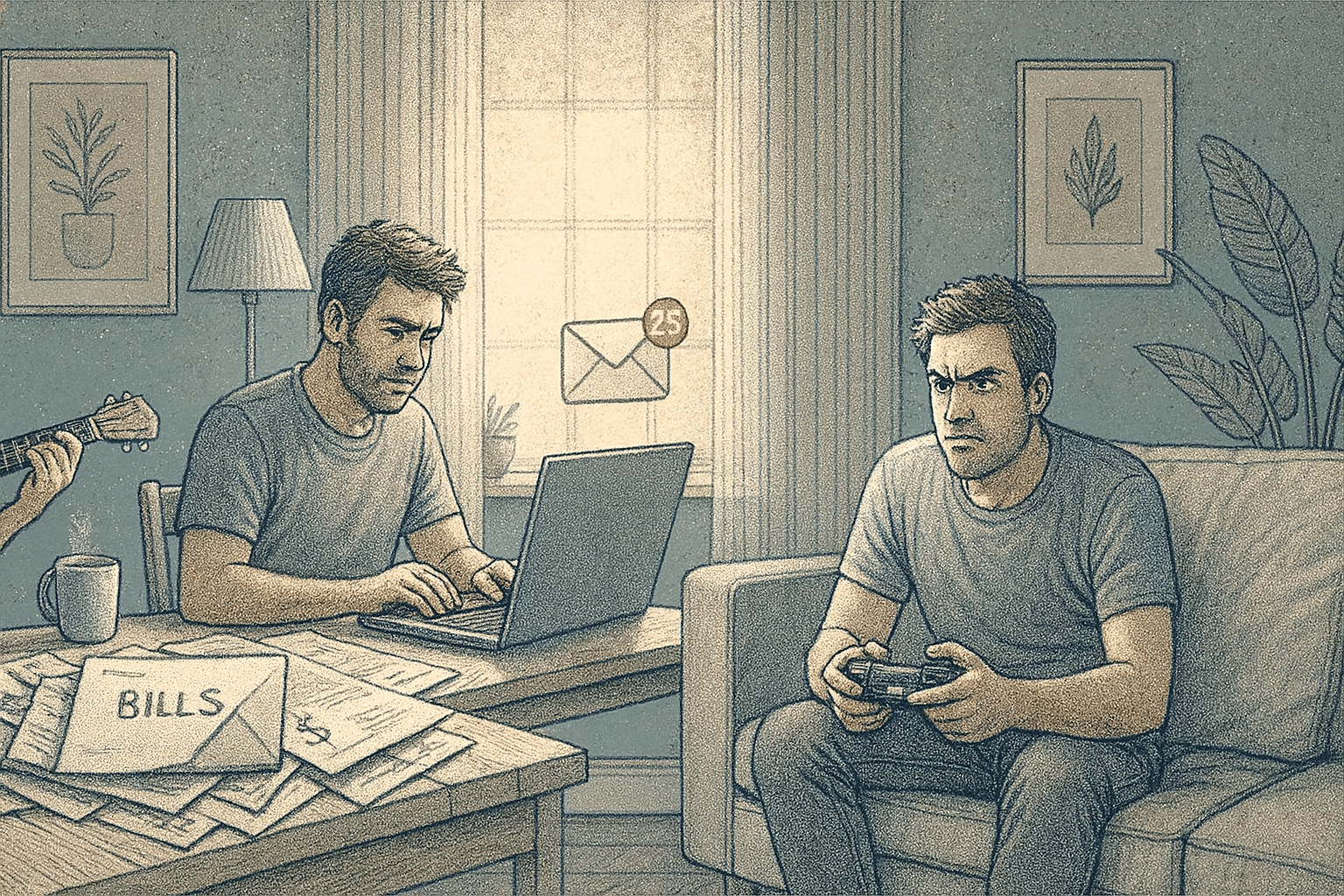Key Takeaways
- High-functioning ADHD in adults often goes unnoticed, as outward success can hide difficulties with focus and executive function.
- Chronic procrastination with last-minute results is a common sign—deadlines often trigger the focus needed to complete tasks.
- Adults with high-functioning ADHD may hyperfocus on engaging work but struggle with routine or boring responsibilities.
- Learning how your ADHD brain works can help you turn challenges into strengths with the right tools and support.
Table of Contents
What Is High-Functioning ADHD in Adults?
High-functioning ADHD describes adults who live with the core symptoms of ADHD but have developed strong coping skills that allow them to succeed in work, relationships, and daily life. Despite appearing put-together, they often deal with inner chaos, struggling to manage attention, emotions, and executive function. This contrast between external success and internal difficulty creates a unique, often overwhelming pressure.
The Hidden Struggle Behind the Success
Every win often comes at the cost of intense behind-the-scenes effort. You might build complex systems just to stay on track, rely heavily on reminders, and lose sleep catching up on tasks. While others see high performance, you carry the weight of burnout, anxiety, and the fear that one misstep could unravel it all.
How High-Functioning ADHD Differs from Traditional ADHD
What sets high-functioning ADHD apart isn’t the symptoms themselves, but how they show up. Traditional ADHD tends to be diagnosed due to clear, external challenges, but high-functioning ADHD can stay hidden because people appear to be doing just fine. Intelligence, creativity, and drive often help mask the struggle, like using strong verbal skills to offset disorganization or diving into hyperfocus to stay productive. These strengths help maintain appearances but can leave you drained. Many are only diagnosed after a life shift, like becoming a parent, getting promoted, or losing routine, disrupts their coping systems.
| A Mission For Michael: Expert Mental Health Care Founded in 2010, A Mission For Michael (AMFM) offers specialized mental health care across Southern California, Minnesota, and Virginia. Our accredited facilities provide residential and outpatient programs, utilizing evidence-based therapies such as CBT, DBT, and EMDR. Our dedicated team of licensed professionals ensures every client receives the best care possible, supported by accreditations from The Joint Commission and the California Department of Health Care Services. We are committed to safety and personalized treatment plans. Start your recovery journey with AMFM today! |
5 Signs of High-Functioning ADHD in Adults
1. Chronic Procrastination That Somehow Gets Results
One of the clearest signs of high-functioning ADHD is always waiting until the last minute, but still delivering. This isn’t just a bad habit; your brain actually relies on the urgency of deadlines to kick into gear. That final push floods your system with the right neurochemicals, finally making it possible to focus and finish. You’ve probably become known as the “miracle worker” who thrives under pressure, but what others don’t see is the anxiety, stress, and exhaustion it causes behind the scenes. Even when you try to start early, your brain just won’t cooperate until the pressure is high enough. Over time, this cycle can take a serious toll: sleep suffers, stress builds, and relationships feel the strain.
2. Impulsiveness That Appears as Spontaneity
Impulsivity in high-functioning ADHD often hides in plain sight. Instead of being disruptive, it can come across as boldness or spontaneity. You might make quick decisions that seem exciting at first, like jumping into projects, relationships, or purchases, only to deal with the fallout later. It’s not that you don’t know better; your brain just reacts faster than it can weigh consequences. Financially, this shows up in unplanned spending, forgotten subscriptions, or risky choices made in the moment. People may praise your adventurous spirit or ability to act fast, but you’re left managing the emotional and practical aftermath. The hardest part? Getting positive feedback for the very behavior that’s quietly stressing you out.
3. Hyperfocus That Masks Attention Issues
Hyperfocus is one of the most misleading aspects of ADHD. You can lose yourself for hours in a task you love, making it seem like attention isn’t an issue at all. But this intense focus is actually part of the same ADHD wiring; it’s not about lacking attention, but struggling to control where it goes. You might get completely absorbed in creative projects, research, or games while struggling to complete simple tasks like responding to emails or paying bills. The dopamine boost from interesting activities temporarily makes focus easy, but the rest of life doesn’t offer that same stimulation. After intense focus, you’re often wiped out, needing time to recover. This cycle of bursts and crashes makes consistent productivity tough and often leaves you wondering why you can’t just focus “on demand.”

Hyperfocus can make you spend hours on creative projects you love while bills pile up and emails go unanswered, creating the illusion that attention isn’t really the problem.
4. Time Blindness Disguised as Being Fashionably Late
Time blindness means you experience time differently. It stretches, shrinks, and often escapes you completely. You might feel like five minutes passed when it’s been an hour, or think a deadline next week is ages away until it suddenly feels like it’s tomorrow. This warped sense of time leads to chronic lateness, missed deadlines, and a constant scramble to catch up. Others may see this as carelessness, but you’re often just as surprised as they are when you realize you’re late. To cope, you probably rely on layers of reminders: alarms, calendars, timers, just to stay on track. These systems help, but they’re draining to manage. The worst part? Despite your best efforts, time-related slip-ups still happen, affecting relationships and increasing anxiety about future commitments.
5. Mental Restlessness That Looks Like Creativity
Your constantly buzzing mind often gets mistaken for creativity. You might come across as full of fresh ideas, quick connections, and out-of-the-box thinking, especially in conversations or brainstorming sessions. But underneath that impressive energy is a restless mental state that rarely turns off. The stream of thoughts isn’t always helpful or welcome. Sometimes, it’s just noise that wears you down.

That constant stream of ideas and quick connections everyone admires might actually be mental restlessness that never switches off, leaving you exhausted by your own thoughts.
This internal activity can be exhausting. Even when you’re outwardly calm, your brain is still jumping from thought to thought, making it hard to focus, relax, or fall asleep. Nights often become your most productive hours, not because you’re a night owl by choice, but because it’s the only time the world quiets down enough for your brain to focus. Unfortunately, that late-night clarity clashes with daily routines, leaving you tired and misaligned with everyone else’s schedule.
People around you may praise your quick thinking without realizing it’s not always intentional or pleasant. What feels like creativity to them might feel like chaos to you—a constant mental hum you didn’t ask for and can’t always control.
Why AMFM is Your Best Choice for Adult ADHD and Mental Health Support

Recovery happens best in environments that feel truly supportive, which is why creating calm, welcoming spaces matters so much for adults working through ADHD and mental health challenges.
Living with high-functioning ADHD as an adult comes with a unique set of challenges—many of which often go unseen. Anxiety, depression, and PTSD frequently show up alongside it, making everyday life harder to manage. At AMFM, our focus is on understanding these layers and creating care plans that are rooted in compassion and clinical expertise. We tailor every step to meet your specific needs so that you can regain a sense of balance and feel more in control.
Our programs are built for adults facing mental health-related struggles, offering support through residential care, partial hospitalization, and intensive outpatient services. Each of our centers in California, Virginia, and Washington State provides a calm, supportive space that encourages real healing. Environment matters, and we work hard to make sure every setting feels like the right place to recover.
What sets AMFM apart is how we approach your experience with care that’s as personal as it is professional. Our team works closely with you to understand your background, address clinical needs, and make insurance easier to navigate. We partner with many major PPO insurance providers and also offer private-pay options, giving you flexibility and peace of mind.
Choosing AMFM means having a partner who sees the full picture and is committed to helping you move forward with clarity, confidence, and care. If you’re ready to start addressing ADHD or other mental health challenges, we’re here to help. Reach out anytime for a free, confidential assessment by calling 866-478-4383. We’re ready when you are!
High-Functioning ADHD FAQs
What is high‑functioning ADHD in adults?
High‑functioning ADHD in adults refers to the presence of core ADHD symptoms combined with well‑developed coping skills that allow for outward success while internal struggles persist.
Can high-functioning ADHD develop later in life, or was it always there?
ADHD doesn’t suddenly appear in adulthood; it’s been there since childhood, though the signs may have been subtle or overlooked. What often seems like “late-onset” ADHD usually surfaces when adult responsibilities pile up and old coping mechanisms stop working. Many adults realize the signs were always there, like zoning out in class or struggling to stay organized, but didn’t cause enough disruption to raise alarms until later in life.
How do I know if I have high-functioning ADHD or if I'm just disorganized?
Occasional disorganization is normal. ADHD shows up as consistent patterns that impact daily life, even with effort. If you’ve always had trouble with focus, follow-through, or time, even in different settings, it’s worth getting evaluated.
Can medication help with high-functioning ADHD if I'm already successful?
Yes, many successful adults find that medication reduces the mental effort it takes to keep everything together. It won’t boost your talent, but it can ease the constant push to stay on track. The goal isn’t more success, it’s less burnout. With the right medication and support, work feels more manageable and less draining. Finding the right fit may take time, so it’s best to work closely with a provider experienced in adult ADHD.
What's the difference between being a procrastinator and having ADHD?
Procrastination is common, but with ADHD, it runs deeper. It’s not just about choosing fun over chores; it’s a real struggle to start tasks, even ones you care about. Your brain might know what needs to be done, but still won’t engage until the last minute. This isn’t laziness, but rather a disconnect between intention and action that can be hard to explain, even to yourself.
How does AMFM support adults with high-functioning ADHD and related conditions?
AMFM gives you a tailored path to wellness, starting with a full assessment and help with insurance. Our team creates a treatment plan that fits your life, supported by compassionate care across our peaceful facilities in California, Virginia, and Washington State. If you’re dealing with ADHD, anxiety, trauma, or other challenges, we’re here to guide you toward lasting recovery. Call for a free, confidential assessment today!













